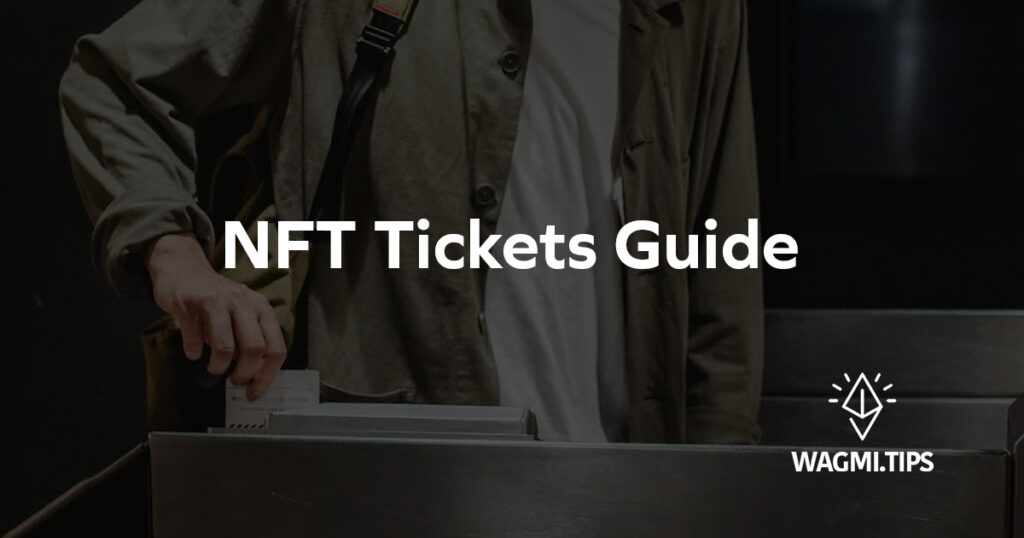Complete Guide To NFT Tickets: How To Make And Sell NFT Tickets
Some people are already calling NFT ticketing the future of the ticketing industry, predicting that it will completely disrupt the industry in the years to come. Can NFT ticketing really overhaul decades of establishment? Let’s find out.

Table of Contents
What Are NFT Tickets?
NFT tickets can be described as event tickets being issued in the form of NFTs. This means that each digital ticket is recorded on the blockchain, instead of being just a digital version of physical event tickets. At first glance, it may look like another marketing gimmick, a fancy NFT application with no practical use after the event is over. But if used strategically, NFT tickets can bring a ton of benefits to both the issuers and the new owners.
What Are The Benefits Of NFT Tickets?
There are numerous benefits to adopting NFT tickets for your next event:
1) Reduce administrative workload: As an issuer, the creation, issuance, validation, and resale of the NFT tickets can be executed in a controlled manner. The existing platforms enable issuers to systematically manage the ticketing process both in the primary and the secondary market.
2) Community building: Similar to a POAP NFTs, NFT tickets can instantly create a community of like-minded individuals circled around a particular event. Through these tickets, issuers can then host token-gated events and rewards in the future. For example, holders will gain presale access to future events or exclusive merchandise.
3) Tradeable tickets: As an NFT, all tickets will be tradeable on NFT exchanges depending on the blockchain in which they were created on. For instance, Polygon-based NFTs will be tradeable on most exchanges including OpenSea and LooksRare. Ticket owners can then sell their tickets before the event, or even after the event if holding the ticket leads to additional perks. OpenSea CEO Devin Finzer also explained the possibility of using these tickets as a collateral to draw a loan through DeFi lending platforms.
4) Eliminate counterfeiting: According to CNBC, around 12% of ticket buyers get scammed in a year. Since NFTs are connected to the blockchain, NFT ticketing virtually eliminates black market transactions and fraudulent activities that run rampant in the industry today.
5) Digital memorabilia: People used to keep and treasure physical tickets as a memory of attending a concert or an NBA All Star game. However, this privilege evaporated with the introduction of digital tickets. NFT tickets can reintroduce this privilege as the tickets remain on the blockchain permanently. Owners can also display them on NFT exchanges or their social media profiles.
What Are Some Events That Have Used NFT Tickets?
We have seen NFT tickets in numerous events including sports events, concerts, art shows, and more. For instance, NFT London 2022, DCENTRAL Miami 2022, SCOPE Art Show, NFT_Tokyo 2022, Jochem’s Comedy Tour, and even live streamed events have leveraged NFT ticketing.
How To Issue NFT Tickets?
Today, 3rd party platforms like Guts and Oveit allow ticket issuers to issue NFT tickets in a few clicks. These platforms build on blockchains with low gas fees such as Polygon to keep costs low. For example, Oveit charges a 2% fee with a $1 minting fee. In addition, both platforms are Ethereum compatible, which allows the NFT tickets to be tradeable on most NFT exchanges.
On the other hand, you can check out our no-code tools to launch your own NFT tickets.
What Are The Challenges Faced With NFT Tickets?
Firstly, the use of NFT tickets will definitely incur a higher cost compared to the traditional ticketing system. The number of conventional ticketing companies available have significantly reduced the cost of event ticketing over the years. However, there are not many reputable NFT ticketing services in the market today, and they do require a different set of technical expertise to be executed smoothly.
In addition, NFT transactions rely on the network traffic of the particular blockchain. Large events may cause network congestion, which in turn leads to longer queues and frustrated guests, especially during physical events.
Conclusion
In conclusion, we believe that NFT ticketing introduces a very favourable risk to reward ratio as a ticketing alternative. Given the low switching cost from traditional ticketing platforms, NFT ticketing can certainly establish an attractive value package for a company and its community. What do you think?
